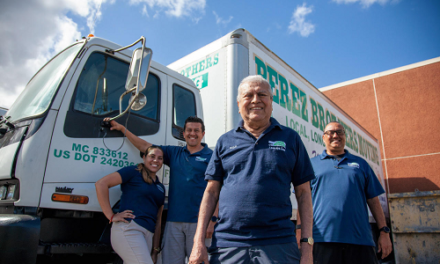.jpg) For people who suffer with pain, today’s healthcare climate can seem like a harsh reality. The implications for finding safe and adequate pain solutions exist for patients and families, and there are shared concerns and burdens experienced by healthcare providers who strive to be a part of the solution and to responsibly manage pain. Pain can be especially challenging for individuals facing serious, chronic illnesses who experience debilitating pain more days than not and have intensifying symptom burden as their disease progresses. While pain not only greatly influences the day to day lives of people who face these illnesses, it can also take a tremendous toll on those who love and care for them. It is not uncommon for caregivers of patients with poorly controlled pain to report their own distressing symptoms such as loss of sleep, poor appetite, neglected hygiene, and mood changes, for example. These findings can add to caregiver fatigue and burnout, contributing to the vast psychosocial complexities of the support system for patients. Poorly controlled pain can have devastating consequences for patients, as well as for their families and caregivers.
For people who suffer with pain, today’s healthcare climate can seem like a harsh reality. The implications for finding safe and adequate pain solutions exist for patients and families, and there are shared concerns and burdens experienced by healthcare providers who strive to be a part of the solution and to responsibly manage pain. Pain can be especially challenging for individuals facing serious, chronic illnesses who experience debilitating pain more days than not and have intensifying symptom burden as their disease progresses. While pain not only greatly influences the day to day lives of people who face these illnesses, it can also take a tremendous toll on those who love and care for them. It is not uncommon for caregivers of patients with poorly controlled pain to report their own distressing symptoms such as loss of sleep, poor appetite, neglected hygiene, and mood changes, for example. These findings can add to caregiver fatigue and burnout, contributing to the vast psychosocial complexities of the support system for patients. Poorly controlled pain can have devastating consequences for patients, as well as for their families and caregivers.
“She has Horrible Pain … Won’t Someone Please Help Us”
The shared media coverage by television, internet, and news sources have brought to the nation’s attention an opiate crisis affecting public health and influencing the countrywide conversation about pain management. Without a doubt, our current opioid predicament has tremendous effects on our collective welfare, both social and economic. The National Institutes of Health (NIH) recently published on their website that the total "economic burden" of prescription opioid misuse alone in the United States is estimated at $78.5 billion a year; including costs of healthcare, lost productivity, addiction treatment, and criminal justice involvement. The website also states that more than 130 people in the United States die after overdosing on opioids every day. The staggering statistical evidence, tragic stories, and untimely deaths illustrate how the issue deserves our full attention and purposeful efforts to responsibly protect our communities and to deploy sound mechanisms for opiate use, diversion and addiction. Our recognition and efforts to end the opiate crisis however does not change the fact that pain exists, and it requires conscientious and dutiful treatment.
Part of the reason I pursued becoming a physician was to satisfy my curiosity of the human body, a wonderous and unique system marvelous in design. How the body responds and adapts to insult and to injury fascinates me, and pain is a unique complexity. Dame Cicely Saunders, an English physician and writer, had a legendary career for pioneering the “modern” hospice movement and for her early emphasis on palliative care in clinical practice. She coined the term ‘‘total pain,” illuminating how complicated and multidimensional pain can be with having physical, psychological, social, emotional, and spiritual components that contribute to a “total pain” experience that is as unique as the people who face it. Palliative Medicine endeavors to maximize quality of life for patients and families facing serious illnesses. It supports curative treatment intended to prolong life, and it also provides choices to life-sustaining treatment near the end of life, particularly when the value and benefits are questionable. This is accomplished by exploring and defining the goals of care for each patient and family, by supporting Advance Care Planning, and by serving as a patient advocate in shared decision making and medical management. Palliative care also focuses on optimizing symptom relief by managing difficult symptoms such as pain, as well as shortness of breath, constipation, nausea, loss of appetite, difficulty sleeping, and depression, to name a few.
Palliative physicians recognize, like other clinicians, that nonopioid alternatives for pain are always considered first-line treatment with examples including nonopioid medicinal products, physical and occupational therapy, selective interventional procedures and treatments, chiropractic treatments, massage therapy, acupuncture, and music and pet therapy. More research for the use of medical marijuana is anticipated for optimizing its role in pain and symptom management. Opioids are not considered first-line treatment for chronic pain outside of cancer, palliative and end-of-life care, and for symptoms associated with shortness of breath (terminal dyspnea) at end of life, with there being exceptions under special circumstances.
Our legislature has enacted bills to safeguard opiate use in Florida. Effective July 1, 2018, House Bill No. 21 increased the regulation, training, and reporting required for prescribing and dispensing controlled substances. It defined acute pain with restrictions on certain prescriptions, required prescribers to consult the prescription drug monitoring program (PDMP) before prescribing controlled substances with certain exceptions, among other mandates. Effective July 1, 2019, House Bill No. 451 (HB 451) established that competent adults have the right of self-determination regarding healthcare decisions, including the right to refuse treatment with a Schedule II opioid controlled substance. The bill also required practitioners to provide an educational pamphlet from the Department of Health (DOH) to inform patients about available nonopioid alternatives for the treatment of pain and to discuss nonopioid alternatives, among other requirements.
Pain control is a central component of symptom management, and its reliable oversight is critically important to patients, families, caregivers, and other healthcare providers. It is imperative to have thoughtful consideration for our opioid crisis while navigating the regulatory landscape, without compromising effective pain management. This can be accomplished with sound strategies and practices that promote the safe use of opioids, prescribed by professionally competent practitioners. The awareness of palliative care in helping to manage pain, as well as to improve health, wellness, and satisfaction, is growing. Most large hospitals recognize the value and offer inpatient palliative care services. I have the privilege to provide and supervise care as the Medical Director for Catholic Palliative Care Services (CPCS). CPCS offers services in various settings, including at home and in hospitals. Since December 2018, CPCS provides palliative care services at Holy Cross Hospital. We partner with physicians at Holy Cross Hospital to support person-centered care and to optimize health in serious illness. The CPCS Team at Holy Cross Hospital includes a fulltime staff comprised of a Board-Certified Palliative Care Physician, Advanced Registered Nurse Practitioner (ARNP), Social Worker, Chaplain, and Nurse Navigator. Our Catholic Palliative Care Team will continue to adapt to the changing healthcare landscape, while advocating and delivering effective pain management for people with pain, and for their families and caregivers. We hear you, and we are here to help.



























